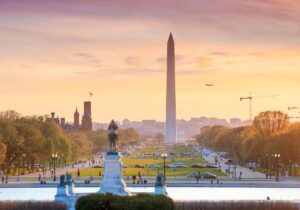Last week, the Hong Kong Democracy and Human Rights Act overwhelmingly passed both legislative chambers with veto-proof majorities. Republicans and Democrats in Congress moved the legislation quickly to deter authorities in Hong Kong from cracking down violently against the ongoing protesters.
Since mid-March, millions of Hong Kong residents have voiced their opposition to legislation that would have allowed citizens and foreigners to be extradited to mainland China. When Chief Executive Carrie Lam responded to anti-legislation demonstrations with derision and police brutality, protesters increased their demands. In addition to the withdrawal of the extradition bill from consideration, Hong Kongers demanded an independent inquiry into police violence, the release of imprisoned protestors, the removal of the government’s characterization of the protests as “riots,” and universal suffrage. Mrs. Lam eventually bowed to public pressure and withdrew the bill in October, but by then it was too late. The battle had morphed into a struggle for the soul of the city.
Until now, Hong Kongers have enjoyed freedoms that people in mainland China do not enjoy, such as the freedom of assembly and freedom of speech, as well as the freedom to practice one’s religion without fear of punishment. Today, however, there is a widespread fear that those freedoms will be rolled back, as China’s authoritarian system closes in on the city of 7.5 million. No doubt, Hong Kong has watched as China has systematically placed over 1 million Ughyur Muslims into “re-education” camps and fear for what their future under a more tightly controlled Hong Kong could look like.
America’s enduring strength comes from values, not valuation. The moral authority of our principles is a power no dictator can fight.
The people of Hong Kong need support from the U.S. and the international community our help, and the U.S. Congress has signaled its support. If enacted, the Hong Kong Human Rights and Democracy Act would mandate an assessment of whether recent political developments in Hong Kong justify changing the city’s unique legal status. In 1992, Congress passed another legislative vehicle, the US-Hong Kong Policy Act, which established Hong Kong as a separate customs and export jurisdiction under U.S. law. This special treatment, which largely enabled Hong Kong to emerge as a global financial city, is contingent on the Communist Party of China, ensuring Hong Kong is governed with a “high degree of autonomy” from the mainland. Practically, it means Hong Kong must be able to retain an independent political, judicial, and economic system from the rest of the country. The Party’s severe crackdown on Hong Kong protestors, utilizing Hong Kong police forces which they control, strikes at the heart of the city’s autonomy.
It is tempting for presidents, who are the final arbiters of exercising state power in foreign affairs, to view the material realm as destiny. But ideas and principles have power too, often above and beyond the visible. Moral authority may well be the most powerful tool in the toolbox of statecraft.
America’s enduring strength comes from values, not valuation. The moral authority of our principles is a power no dictator can fight. Tyranny fears freedom, and tyrants fear their people. Standing for liberty abroad is not a mere aspiration or idealistic dream; it is a vital American interest.
China’s Communist Party can break international commitments, but it cannot justify doing so on moral grounds. It can negate trade commitments, but it cannot defend an oppressive system as moral. Signing the Hong Kong Democracy and Human Rights Act would exploit this intrinsic weakness in two key ways.
First, the legislation requires a reassessment from the State Department as to whether Beijing is holding up its obligations to maintain Hong Kong’s autonomy. Any reasonable review can only conclude that the CCP has failed to keep this obligation faithfully. The Administration would then have the option of adjusting or revoking the special economic treatment the U.S. has afforded the island-city since 1992. Such leverage is undoubtedly economic, but it is also ideational. Morals are upheld when wrong action is met with proportionate consequences. An American recalibration of its treatment of Hong Kong would send a simple yet powerful message: Communist China is not trustworthy, and duplicity comes at a cost.
As the current primary caretaker of American foreign policy, President Trump must recognize the real power and leverage at his disposal.
Second, enacting and enforcing this law would put an end to the CCP’s propaganda line that Hong Kong is a private matter. Beijing has stated that “The U.S. should immediately stop interfering in China’s internal affairs, including Hong Kong affairs, or the negative consequences will boomerang on itself.” Dictators wield propaganda to conceal the truth. It, in turn, hides either strength or weakness. In this case, the Party seeks to inoculate itself from moral scrutiny in the name of sovereignty. Moreover, the fate of Hong Kong directly impacts the United States. Washington has calibrated its economic treatment of the city for nearly three decades on the presumption that certain moral norms would persist.
As the current primary caretaker of American foreign policy, President Trump must recognize the real power and leverage at his disposal. The key lies not in endless negotiation but healthy confrontation. The Communist Party will likely violate any deal it strikes with him, but it cannot withstand moral scrutiny.
Signing this bill, therefore, represents one of the most robust tools that the Administration currently has at its disposal to counter China morally. Enacting this policy would send a clear message to Beijing that America won’t be bullied and will continue to stand up for the human rights of all people.








 Sponsor a student for Christianity & National Security 2024
Sponsor a student for Christianity & National Security 2024